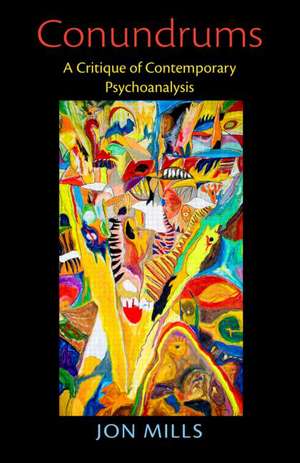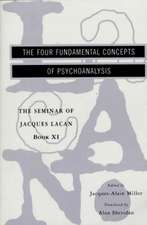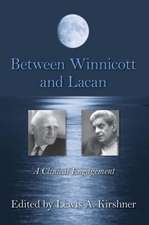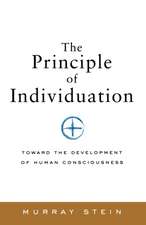Conundrums: A Critique of Contemporary Psychoanalysis
Autor Jon Millsen Limba Engleză Paperback – 22 dec 2011
| Toate formatele și edițiile | Preț | Express |
|---|---|---|
| Paperback (1) | 382.42 lei 6-8 săpt. | |
| Taylor & Francis – 22 dec 2011 | 382.42 lei 6-8 săpt. | |
| Hardback (1) | 817.35 lei 6-8 săpt. | |
| Taylor & Francis – 5 ian 2012 | 817.35 lei 6-8 săpt. |
Preț: 382.42 lei
Preț vechi: 402.55 lei
-5% Nou
Puncte Express: 574
Preț estimativ în valută:
73.18€ • 78.25$ • 61.01£
73.18€ • 78.25$ • 61.01£
Carte tipărită la comandă
Livrare economică 17 aprilie-01 mai
Preluare comenzi: 021 569.72.76
Specificații
ISBN-13: 9780415898850
ISBN-10: 0415898854
Pagini: 264
Dimensiuni: 152 x 229 x 25 mm
Greutate: 0.45 kg
Ediția:1
Editura: Taylor & Francis
Colecția Routledge
Locul publicării:Oxford, United Kingdom
ISBN-10: 0415898854
Pagini: 264
Dimensiuni: 152 x 229 x 25 mm
Greutate: 0.45 kg
Ediția:1
Editura: Taylor & Francis
Colecția Routledge
Locul publicării:Oxford, United Kingdom
Public țintă
Postgraduate, Professional, and Professional Practice & DevelopmentCuprins
Philosophical Presuppositions of Relational Psychoanalysis. The Problem with Postmodernism. Illegitimate Attacks on Classical Psychoanalysis. Therapeutic Excess. Contemporary Politics. Psychoanalysis and its Critics. Approaching Consilience.
Notă biografică
Jon Mills, Psy.D., Ph.D., ABPP is a philosopher, psychologist, and psychoanalyst. He is a Diplomate in Psychoanalysis and Clinical Psychology with the American Board of Professional Psychology, Fellow of the American Academy of Clinical Psychology, Fellow of the Academy of Psychoanalysis, and is past President and Fellow of the Section on Psychoanalytic and Psychodynamic Psychology of the Canadian Psychological Association. A Professor of Psychology and Psychoanalysis at the Adler Graduate Professional School in Toronto, he is on the editorial board of Psychoanalytic Psychology and is the editor of two book series as well as the author of 11 books, including Origins: On the Genesis of Psychic Reality (McGill-Queens University Press, 2010), winner of the 2011 Gradiva Award. He maintains a private practice and runs a mental health corporation in Ontario, Canada. Professor Jon Mills is the recipient of the 2014 CPA Weininger Award for Lifetime Contributions to Psychoanalysis and/or Psychodynamic Psychology.
Recenzii
"This extraordinary work by one of the most scholarly psychoanalytic thinkers of our time is a welcome and much-needed reappraisal of the relational perspective in contemporary psychoanalysis. Mills brings his rich philosophical background to bear in this detailed and illuminating critique of both the pros and cons of relational psychoanalysis that will be invaluable to those who embrace the contemporary perspective as well as those who find some of its tenets wanting. This is by far the best and most original book of its kind. Essential reading!" - M. Guy Thompson, Ph.D., Supervising Analyst, Psychoanalytic Institute of Northern California, and author, The Ethic of Honesty (Rodopi, 2003)
"Critique of psychoanalysis, coming from the usual suspects, is a bit of a bore. Coming from the inside by a clinician who is also an academic, is something completely different. History testifies to the fact that there is a rather annoying tradition of burning these critics at the stake. To make things even worse, Mills denudes the philosophical premises of contemporary psychoanalysis (relational, intersubjective, and postmodern) with great erudition. The net result is that the reader receives an insightful view into the psychoanalytic conundrum, as well as arguments against (e.g., Grunbaum's critique, psychoanalytic authoritarianism, and sectism). The book ends with a further elaboration of a systematic psychoanalytic metaphysics, explaining how the unconscious generates mind. Psychoanalysis has a future as long as there are colleagues like Jon Mills." - Paul Verhaeghe, Head of the Department of Psychoanalysis, University of Ghent, Belgium, and author, On Being Normal and Other Disorders (Other Press, 2004)
"In this text, Mills offers his readers a broad and deep analysis of the philosophical underpinnings of contemporary relational psychoanalysis. While appreciating the many creative contributions relational thought has made to clinical practice, the author offers a probing critique of some of the leading relational authors. Such critiques, I believe, can enrich psychoanalysis by promoting an ongoing dialogue, thereby deepening awareness, among practitioners, of their theoretical models. Mills' exposition of Freud's object relations theory is one of the best I have read in years." - Gerald J. Gargiulo, Ph.D., author, Psyche, Self and Soul (Wiley, 2005) and Broken Fathers/Broken Sons (Rodopi, 2008)
"Jon Mills makes admirable use of his double training as philosopher and practicing psychoanalyst in Conundrums. In this book, he discusses both the improvements and the deficiencies of contemporary relational psychoanalysis, both on the basis of theory and his clinical experience. Thus he praises the more personal, authentic, humane, and reciprocal dimension of psychoanalysis as argued for by interpersonal psychoanalysis, as opposed to some previous theoreticians who argued for a rigid interpretation of neutrality, anonymity, and abstinence. But Mills also argues that relational psychoanalysis overlooks the phenomenon of the patient's own inner life and Freud's discovery of the challenge to each human being to construct his or her own way of dealing with the demands of impulses. A remarkable and compelling book." - Wilfried Ver Eecke, Ph.D., Department of Philosophy, Georgetown University, and author, Denial, Negation, and the Forces of the Negative (SUNY Press, 2006)
"This extraordinary work by one of the most scholarly psychoanalytic thinkers of our time is a welcome and much-needed reappraisal of the relational perspective in contemporary psychoanalysis. Mills brings his rich philosophical background to bear in this detailed and illuminating critique of both the pros and cons of relational psychoanalysis that will be invaluable to those who embrace the contemporary perspective as well as those who find some of its tenets wanting. This is by far the best and most original book of its kind. Essential reading!" - M. Guy Thompson, Ph.D., Supervising Analyst, Psychoanalytic Institute of Northern California, and author, The Ethic of Honesty (Rodopi, 2003)
"Critique of psychoanalysis, coming from the usual suspects, is a bit of a bore. Coming from the inside by a clinician who is also an academic, is something completely different. History testifies to the fact that there is a rather annoying tradition of burning these critics at the stake. To make things even worse, Mills denudes the philosophical premises of contemporary psychoanalysis (relational, intersubjective, and postmodern) with great erudition. The net result is that the reader receives an insightful view into the psychoanalytic conundrum, as well as arguments against (e.g., Grunbaum's critique, psychoanalytic authoritarianism, and sectism). The book ends with a further elaboration of a systematic psychoanalytic metaphysics, explaining how the unconscious generates mind. Psychoanalysis has a future as long as there are colleagues like Jon Mills." - Paul Verhaeghe, Head of the Department of Psychoanalysis, University of Ghent, Belgium, and author, On Being Normal and Other Disorders (Other Press, 2004)
"In this text, Mills offers his readers a broad and deep analysis of the philosophical underpinnings of contemporary relational psychoanalysis. While appreciating the many creative contributions relational thought has made to clinical practice, the author offers a probing critique of some of the leading relational authors. Such critiques, I believe, can enrich psychoanalysis by promoting an ongoing dialogue, thereby deepening awareness, among practitioners, of their theoretical models. Mills' exposition of Freud's object relations theory is one of the best I have read in years." - Gerald J. Gargiulo, Ph.D., author, Psyche, Self and Soul (Wiley, 2005) and Broken Fathers/Broken Sons (Rodopi, 2008)
"Jon Mills makes admirable use of his double training as philosopher and practicing psychoanalyst in Conundrums. In this book, he discusses both the improvements and the deficiencies of contemporary relational psychoanalysis, both on the basis of theory and his clinical experience. Thus he praises the more personal, authentic, humane, and reciprocal dimension of psychoanalysis as argued for by interpersonal psychoanalysis, as opposed to some previous theoreticians who argued for a rigid interpretation of neutrality, anonymity, and abstinence. But Mills also argues that relational psychoanalysis overlooks the phenomenon of the patient's own inner life and Freud's discovery of the challenge to each human being to construct his or her own way of dealing with the demands of impulses. A remarkable and compelling book." - Wilfried Ver Eecke, Ph.D., Department of Philosophy, Georgetown University, and author, Denial, Negation, and the Forces of the Negative (SUNY Press, 2006)
"Dr. Mills has written an extremely important book that endeavors to grapple with a number of problems confronting psychoanalysis as a field. Not only does he revitalize interest in the importance of the unconscious by articulating its philosophical ground, but exposes the politics that (wrongly) influence matters of theory and practice. His examples of the political in-fighting will certainly be noticed by historians of the field and will become part of our collective history—it took great courage to write about these matters with so many of these individuals still in positions of power. I thoroughly enjoyed the book and look forward to Dr. Mills future work." - Ronald Naso, Ph.D., author of Hypocrisy Unmasked (Jason Aronson, 2010)
"I find his newest text to be a scholarly, thoughtful and well-written critique of contemporary psychoanalysis. His willingness to speak to, in my opinion, the central -and most politically incorrect- question to be asked of contemporary psychoanalysis is refreshing, provocative, and long overdue: What happened to the (Freudian) unconscious in the relational, intersubjective, and postmodern perspectives of psychoanalysis? His focus on the philosophical underpinnings of these perspectives, and their theoretical relation to more traditional psychoanalytical thought is incisive. His emphasis on articulating the conundrums contained therein is masterful and constitutes essential reading for the psychoanalytic educator, student, and practitioner.I will be highly recommending Conundrums to my colleagues and students." - Patrick B. Kavanaugh, Ph.D., author of Stories From the Bog: On Madness, Philosophy and Psychoanalysis (2012, Rodopi)
"Critique of psychoanalysis, coming from the usual suspects, is a bit of a bore. Coming from the inside by a clinician who is also an academic, is something completely different. History testifies to the fact that there is a rather annoying tradition of burning these critics at the stake. To make things even worse, Mills denudes the philosophical premises of contemporary psychoanalysis (relational, intersubjective, and postmodern) with great erudition. The net result is that the reader receives an insightful view into the psychoanalytic conundrum, as well as arguments against (e.g., Grunbaum's critique, psychoanalytic authoritarianism, and sectism). The book ends with a further elaboration of a systematic psychoanalytic metaphysics, explaining how the unconscious generates mind. Psychoanalysis has a future as long as there are colleagues like Jon Mills." - Paul Verhaeghe, Head of the Department of Psychoanalysis, University of Ghent, Belgium, and author, On Being Normal and Other Disorders (Other Press, 2004)
"In this text, Mills offers his readers a broad and deep analysis of the philosophical underpinnings of contemporary relational psychoanalysis. While appreciating the many creative contributions relational thought has made to clinical practice, the author offers a probing critique of some of the leading relational authors. Such critiques, I believe, can enrich psychoanalysis by promoting an ongoing dialogue, thereby deepening awareness, among practitioners, of their theoretical models. Mills' exposition of Freud's object relations theory is one of the best I have read in years." - Gerald J. Gargiulo, Ph.D., author, Psyche, Self and Soul (Wiley, 2005) and Broken Fathers/Broken Sons (Rodopi, 2008)
"Jon Mills makes admirable use of his double training as philosopher and practicing psychoanalyst in Conundrums. In this book, he discusses both the improvements and the deficiencies of contemporary relational psychoanalysis, both on the basis of theory and his clinical experience. Thus he praises the more personal, authentic, humane, and reciprocal dimension of psychoanalysis as argued for by interpersonal psychoanalysis, as opposed to some previous theoreticians who argued for a rigid interpretation of neutrality, anonymity, and abstinence. But Mills also argues that relational psychoanalysis overlooks the phenomenon of the patient's own inner life and Freud's discovery of the challenge to each human being to construct his or her own way of dealing with the demands of impulses. A remarkable and compelling book." - Wilfried Ver Eecke, Ph.D., Department of Philosophy, Georgetown University, and author, Denial, Negation, and the Forces of the Negative (SUNY Press, 2006)
"This extraordinary work by one of the most scholarly psychoanalytic thinkers of our time is a welcome and much-needed reappraisal of the relational perspective in contemporary psychoanalysis. Mills brings his rich philosophical background to bear in this detailed and illuminating critique of both the pros and cons of relational psychoanalysis that will be invaluable to those who embrace the contemporary perspective as well as those who find some of its tenets wanting. This is by far the best and most original book of its kind. Essential reading!" - M. Guy Thompson, Ph.D., Supervising Analyst, Psychoanalytic Institute of Northern California, and author, The Ethic of Honesty (Rodopi, 2003)
"Critique of psychoanalysis, coming from the usual suspects, is a bit of a bore. Coming from the inside by a clinician who is also an academic, is something completely different. History testifies to the fact that there is a rather annoying tradition of burning these critics at the stake. To make things even worse, Mills denudes the philosophical premises of contemporary psychoanalysis (relational, intersubjective, and postmodern) with great erudition. The net result is that the reader receives an insightful view into the psychoanalytic conundrum, as well as arguments against (e.g., Grunbaum's critique, psychoanalytic authoritarianism, and sectism). The book ends with a further elaboration of a systematic psychoanalytic metaphysics, explaining how the unconscious generates mind. Psychoanalysis has a future as long as there are colleagues like Jon Mills." - Paul Verhaeghe, Head of the Department of Psychoanalysis, University of Ghent, Belgium, and author, On Being Normal and Other Disorders (Other Press, 2004)
"In this text, Mills offers his readers a broad and deep analysis of the philosophical underpinnings of contemporary relational psychoanalysis. While appreciating the many creative contributions relational thought has made to clinical practice, the author offers a probing critique of some of the leading relational authors. Such critiques, I believe, can enrich psychoanalysis by promoting an ongoing dialogue, thereby deepening awareness, among practitioners, of their theoretical models. Mills' exposition of Freud's object relations theory is one of the best I have read in years." - Gerald J. Gargiulo, Ph.D., author, Psyche, Self and Soul (Wiley, 2005) and Broken Fathers/Broken Sons (Rodopi, 2008)
"Jon Mills makes admirable use of his double training as philosopher and practicing psychoanalyst in Conundrums. In this book, he discusses both the improvements and the deficiencies of contemporary relational psychoanalysis, both on the basis of theory and his clinical experience. Thus he praises the more personal, authentic, humane, and reciprocal dimension of psychoanalysis as argued for by interpersonal psychoanalysis, as opposed to some previous theoreticians who argued for a rigid interpretation of neutrality, anonymity, and abstinence. But Mills also argues that relational psychoanalysis overlooks the phenomenon of the patient's own inner life and Freud's discovery of the challenge to each human being to construct his or her own way of dealing with the demands of impulses. A remarkable and compelling book." - Wilfried Ver Eecke, Ph.D., Department of Philosophy, Georgetown University, and author, Denial, Negation, and the Forces of the Negative (SUNY Press, 2006)
"Dr. Mills has written an extremely important book that endeavors to grapple with a number of problems confronting psychoanalysis as a field. Not only does he revitalize interest in the importance of the unconscious by articulating its philosophical ground, but exposes the politics that (wrongly) influence matters of theory and practice. His examples of the political in-fighting will certainly be noticed by historians of the field and will become part of our collective history—it took great courage to write about these matters with so many of these individuals still in positions of power. I thoroughly enjoyed the book and look forward to Dr. Mills future work." - Ronald Naso, Ph.D., author of Hypocrisy Unmasked (Jason Aronson, 2010)
"I find his newest text to be a scholarly, thoughtful and well-written critique of contemporary psychoanalysis. His willingness to speak to, in my opinion, the central -and most politically incorrect- question to be asked of contemporary psychoanalysis is refreshing, provocative, and long overdue: What happened to the (Freudian) unconscious in the relational, intersubjective, and postmodern perspectives of psychoanalysis? His focus on the philosophical underpinnings of these perspectives, and their theoretical relation to more traditional psychoanalytical thought is incisive. His emphasis on articulating the conundrums contained therein is masterful and constitutes essential reading for the psychoanalytic educator, student, and practitioner.I will be highly recommending Conundrums to my colleagues and students." - Patrick B. Kavanaugh, Ph.D., author of Stories From the Bog: On Madness, Philosophy and Psychoanalysis (2012, Rodopi)
















